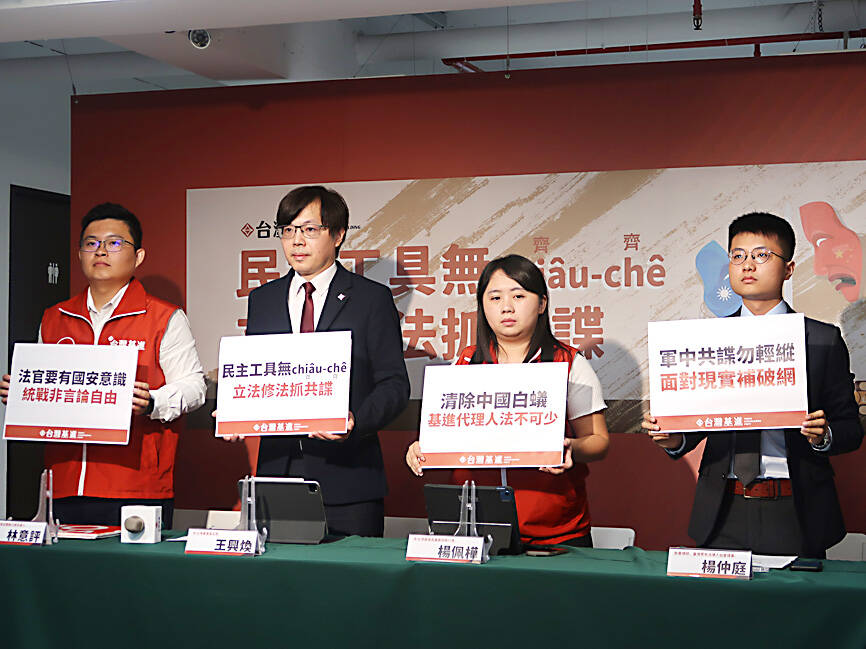The government should promulgate amendments to the National Security Act (國家安全法) that were passed last year to deal with the growing issue of Chinese espionage, the Taiwan Statebuilding Party (TSP) said yesterday.
“Chinese espionage is rampant in Taiwan, because people here are confused about their national identity and the punishments for spying are very lenient,” TSP Chairman Wang Hsing-huan (王興煥) said.
The Republic of China political system does not recognize the People’s Republic of China as a foreign country, or as an enemy, which means the judicial system cannot treat Chinese espionage as foreign aggression, Wang said.

Photo: Chen Yu-fu, Taipei Times
The average sentence for espionage in Taiwan is only 18 months, compared with 19 years in some democratic countries, he said, adding that from 2014 to this year, the average prison term for espionage in Taiwan was about one year.
Espionage cases have been tried under the Trade Secrets Act (營業秘密法) the Criminal Code and past versions of the National Security Act, but the law must adapt to the new means and technology employed by China in its effort to infiltrate Taiwan, Wang said.
The TSP has been pushing a draft “agents of foreign powers act,” but it has been stalled at the Legislative Yuan for four years, he said.
“The administration appears conservative and shrinking in the face of Chinese aggression and infiltration. However, with public support, the TSP will continue to push legislation to tackle Chinese spies,” he said.
Youth Jurist Association of Taiwan director and lawyer Yang Chung-ting (楊仲庭) compared the disproportionately low sentences in espionage cases to a corruption case in which a military official in Kinmen County was sentenced to 12 years in prison for embezzling NT$7,990 of public funds.
The leniency shown in spy cases demonstrates a lack of awareness regarding national security threats among judges, he said.
Currently, those indicted for spying for China can often only be charged with contravening Article 2 of the National Security Act, which stipulates penalties for “initiating, funding, hosting, manipulating, directing or developing an organization,” he said.
However, it is hard to convict someone of such a crime in times of peace, as it is difficult to prove that a person is acting under the command of the Chinese Communist Party, he said.
Lin Yi-ping (林意評), chairman of the TSP’s Yilan County chapter, said that one challenge with current and retired Taiwanese military personnel who spy for China is that judges see expressions of support for Taiwan’s unification with China as expressions of free speech.
“However, China uses Taiwan’s freedom of speech to infringe on its national security,” he said.

Taiwan is stepping up plans to create self-sufficient supply chains for combat drones and increase foreign orders from the US to counter China’s numerical superiority, a defense official said on Saturday. Commenting on condition of anonymity, the official said the nation’s armed forces are in agreement with US Admiral Samuel Paparo’s assessment that Taiwan’s military must be prepared to turn the nation’s waters into a “hellscape” for the Chinese People’s Liberation Army (PLA). Paparo, the commander of the US Indo-Pacific Command, reiterated the concept during a Congressional hearing in Washington on Wednesday. He first coined the term in a security conference last

Prosecutors today declined to say who was questioned regarding alleged forgery on petitions to recall Democratic Progressive Party (DPP) legislators, after Chinese-language media earlier reported that members of the Chinese Nationalist Party (KMT) Youth League were brought in for questioning. The Ministry of Justice Investigation Bureau confirmed that two people had been questioned, but did not disclose any further information about the ongoing investigation. KMT Youth League members Lee Hsiao-liang (李孝亮) and Liu Szu-yin (劉思吟) — who are leading the effort to recall DPP caucus chief executive Rosalia Wu (吳思瑤) and Legislator Wu Pei-yi (吳沛憶) — both posted on Facebook saying: “I

The Ministry of Economic Affairs has fined Taobao NT$1.2 million (US$36,912) for advertisements that exceed its approved business scope, requiring the Chinese e-commerce platform to make corrections in the first half of this year or its license may be revoked. Lawmakers have called for stricter enforcement of Chinese e-commerce platforms and measures to prevent China from laundering its goods through Taiwan in response to US President Donald Trump’s heavy tariffs on China. The Legislative Yuan’s Finance Committee met today to discuss policies to prevent China from dumping goods in Taiwan, inviting government agencies to report. Democratic Progressive Party Legislator Kuo Kuo-wen (郭國文) said

The Ministry of Economic Affairs has fined Taobao NT$1.2 million (US$36,900) for advertisements that exceeded its approved business scope and ordered the Chinese e-commerce platform to make corrections in the first half of this year or its license would be revoked. Lawmakers have called for stricter supervision of Chinese e-commerce platforms and more stringent measures to prevent China from laundering its goods through Taiwan as US President Donald Trump’s administration cracks down on origin laundering. The legislature’s Finance Committee yesterday met to discuss policies to prevent China from dumping goods in Taiwan, inviting government agencies to report on the matter. Democratic Progressive Party